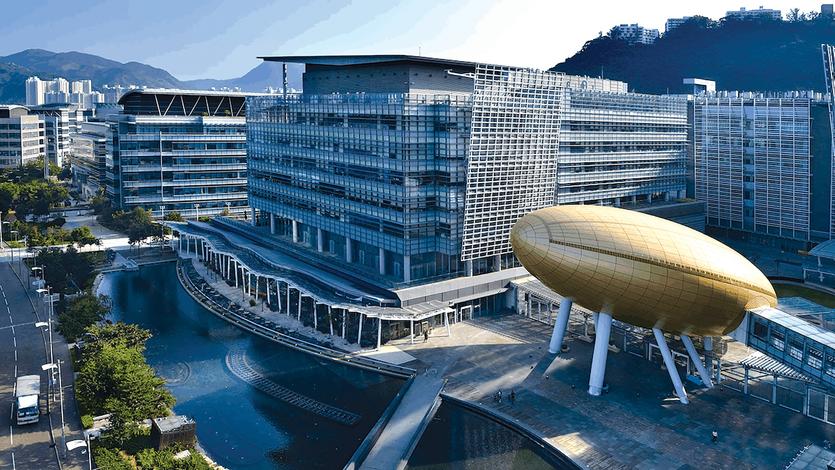Hong Kong is creating a vibrant climate for innovation and technology startups to grow and prepare themselves to tap the vast potential in the Greater Bay Area. Su Zihan reports from Hong Kong.
 A view of the Hong Kong Science Park, which is located at Pak Shek Kok, New Territories. (PHOTO PROVIDED TO CHINA DAILY)
A view of the Hong Kong Science Park, which is located at Pak Shek Kok, New Territories. (PHOTO PROVIDED TO CHINA DAILY)
The Hong Kong Special Administrative Region has made significant investments in the past few years to prop up the innovation and technology industry, creating an increasingly vibrant climate for the sector’s development.
Vast strides have been made in this direction, with a host of measures being implemented, laying a solid foundation for the industry to grow. Related infrastructure has been put in place and upgraded, talents have been assembled and efforts have been made to support entrepreneurship, promote research and development, and transform research findings to create a thriving startup ecosystem.
The inno-tech industry has ushered in a golden period and is on track to be one of the key drivers of the SAR’s economic advancement. According to the latest data from the Hong Kong Trade Development Council, the number of tech startups in the city had reached 3,755 in 2021, employing more than 13,000 people.
With such strategic investments and the opportunities created by the development of the Guangdong-Hong Kong-Macao Greater Bay Area, Hong Kong is leveraging its strengths to achieve its goal of becoming a leading global inno-tech hub.
However, Sunny Chai Ngai-chiu, chairman of Hong Kong Science and Technology Parks Corp, says Hong Kong still has much more to do. Compared with other cities in the 11-city Greater Bay Area, Hong Kong’s downstream manufacturing capability still isn’t strong enough to sustain the industry’s long-term growth.
Chai shares his views on how Hong Kong can further strengthen original innovation, better utilize its upstream and downstream industries, attract talents and improve the ecosystem for the inno-tech sector’s long-term development.
“The process of transforming innovative ideas into products during the R&D stage is just the first step. The repositioning of three industrial estates in Tai Po, Yuen Long and Tseung Kwan O as InnoParks is the second step, which will allow innovative products to achieve small-scale production and testing in Hong Kong, injecting new growth momentum into the city’s economy by promoting innofacturing and reindustrialization,” he says.
“But to fully meet the industry’s growing needs, Hong Kong’s inno-tech ecosystem must be extended to the (whole) Greater Bay Area as the third step, merging the upstream and downstream industries in the region,” he says. This would result in a value-added chain covering the upstream, midstream and downstream industries.
The nation’s 14th Five-Year Plan (2021-25) backs Hong Kong’s bid to be an international center for innovation and technology. While focusing its resources on upstream research and development, the SAR government is also striving to help a number of leading universities and research centers to commercialize their high-quality research and development results.
“To take our development to a higher level and hasten our goal to be a global inno-tech hub, a comprehensive inno-tech ecosystem covering research, financing, production and market has to be set up,” says Lillian Cheong Man-lei, undersecretary for innovation, technology and industry.
The Innovation, Technology and Industry Bureau has made reindustrialization a permanent policy and the focus of its work. Priority will be given to developing innovation and technology infrastructures, implementing land granting and other facilitation measures in collaboration with various departments, and bringing more high-value-added and high-tech manufacturing processes and production lines into Hong Kong to upgrade the inno-tech ecosystem.
Luring, nurturing talent
Apart from strengthening the training of local talents, Cheong says the government will continue to promote projects that can pool together both local and overseas professionals for research and development, as well as teaching.
She says a vibrant inno-tech ecosystem is a crucial driving force in luring talents to the SAR. The government has been nurturing future leaders in the inno-tech sector and adopting a multipronged approach to enlarge the talent pool through a series of initiatives. These have included the launch of the IT Innovation Lab in Schools program in 2020 and the Knowing More About IT program last year to provide funding for secondary and primary schools to organize information technology-related extracurricular activities. Subsidies have been given to outstanding university students taking up local internships, joining overseas exchange programs or receiving mentorship.
Chai agrees that talent is important in driving inno-tech development. Apart from strengthening the training of local talents, the SAR government should promote projects for both local and overseas technology professionals for R&D and teaching.
"We are deeply grateful for President Xi Jinping’s visit to Hong Kong Science Park and his acknowledgement of the I&T progress in Hong Kong. HKSTP will seize the opportunities under the 14th Five-Year-plan and the Greater Bay Area to deepen the integration between Hong Kong and Shenzhen with the development of the Northern Metropolis, San Tin Technopole and the ‘Twin cities, Three circles’ initiatives,” he says.
HKSTP is setting up the GBA InnoAcademy and GBA InnoExpress in the Hong Kong Science Park Shenzhen Branch to provide resources, training, and an exchange platform for I&T talent across the GBA, supporting their specific needs at different business growth stages, he adds.
“Hong Kong is very attractive to global business as a financial center. It has a lot to offer for many talents if they are interested in relocating to Hong Kong to experience the local, economic and business environment,” says Abel Zhao, CEO of FreeD Group, a Hong Kong-based software company that focuses on the utilization of artificial intelligence, big data and machine learning.
He hopes emerging startups can actively collaborate with universities and academic institutions to build up a pool of talent for their long-term growth.
Contact the writer at suzihan@chinadailyhk.com


